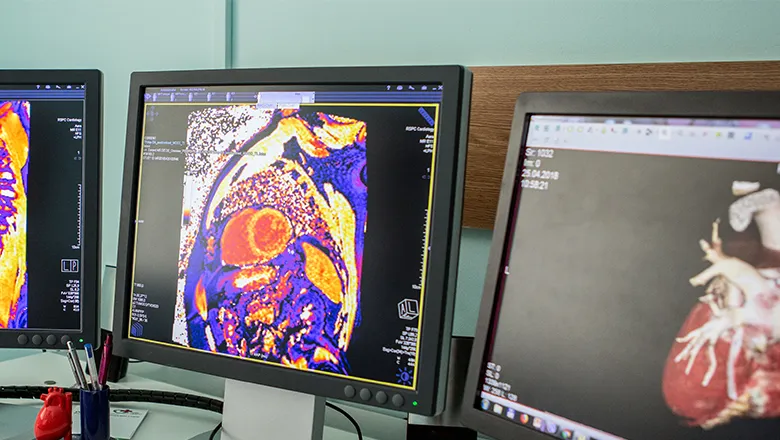“This research will be the first to provide insights into the causal relationship between the disease-promoting enzyme and the development of plaques that can cause a life-threatening event."
Dr Alkystis Phinikaridou
14 September 2020
Dr Alkystis Phinikaridou awarded British Heart Foundation grant
The project sees collaboration between researchers at the School’s Department of Biomedical Engineering, clinicians at the Department of Academic Surgery and a new collaboration with the Heart Research Institute in Australia.

Dr Alkystis Phinikaridou, lecturer in Imaging Biology in the School of Biomedical Engineering & Imaging Sciences has been awarded a £268,162.00 British Heart Foundation grant for a project using imaging to detect and treat fatty arteries caused by a disease promoting inflammatory enzyme known as myeloperoxidase.
Using a smart MRI probe, innovative MRI protocols and complimentary tissue analysis, Dr Phinikaridou’s project will measure the activity of the enzyme in a rabbit model of atherosclerosis (fatty arteries) and high-risk plaques.
Dr Phinikardiou said the study will address important aspects of interventional cardiology by underpinning the role of MRI as a non-invasive method able to detect patients at risk, by imaging disease activity, and guide delivery of “tailored” therapies for reducing risk and maximizing patient benefit.
Her work will also elucidate the therapeutic benefit of preventive inhibition of myeloperoxidase activity and thus lowering inflammation in reducing the development of plaques that are life-threatening.
“We will investigate whether MRI can selectively identify high-risk plaque, based on measuring disease activity, and guide treatment for reducing the risk of heart attack and stroke in a precision medicine approach,” Dr Phinikaridou said.
It will involve the collaboration between researchers at the School’s Department of Biomedical Engineering, clinicians at the Department of Academic Surgery, part of the School of Cardiovascular Medicine and Sciences, and a new collaboration with Professor Roland Stocker’s group at the Heart Research Institute in Australia.
“It will allow to develop and validate the potential diagnostic value of imaging arterial myeloperoxidase activity as a strategy for detecting plaque at risk to rupture causing a life-threatening event."
“We want to pave the way for interventional studies to establish whether myeloperoxidase activity is a therapeutic target to stabilize existing high-risk plaque.”
The BHF grant will facilitate the employment of a highly skilled research associate and will strengthen the scientific collaboration between researchers at King’s College London and the Heart Research Institute in Australia.
Subreena Simrick, Senior Research Adviser at the British Heart Foundation, said: “Each year, thousands of people in the UK suffer a life-threatening heart attack or stroke with potentially devastating consequences for them and their families.
“This research programme could help us identify and treat plaques that are at high risk of rupturing and causing one of these dangerous health events. Ultimately this research has the potential to save lives by enabling doctors to make early targeted interventions."
Subreena Simrick, Senior Research Adviser at the British Heart Foundation
“Funding high-quality research like this is only possible thanks to the generosity of the public whose support has already helped saved countless lives.”

